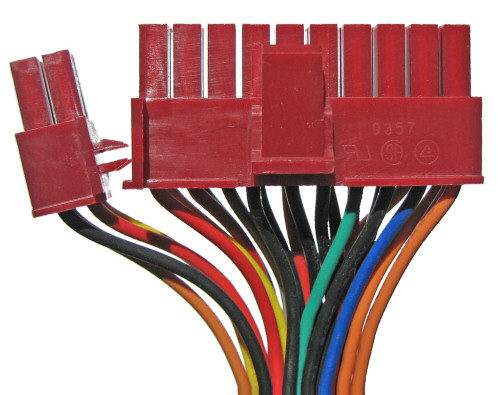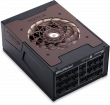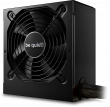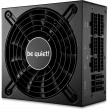Raider 750W Quiet PSU, 80+ Bronze Discontinued | |
Raider 650W Quiet PSU, 80+ Bronze Discontinued | |
Raider 550W Quiet PSU, 80+ Bronze Discontinued | |
Raider 450W Quiet PSU, 80+ Bronze Discontinued | |
| More variations available Show | |
FSP Raider Series PSUs
Introducing the wallet-friendly Raider series of PSU’s from the renowned world leader in PSU manufacturing FSP. Raider power supplies provide an excellent mix of quality and performance at an affordable price.
The Raider Series PSUs are the latest range of power supplies from FSP, the highly respected manufacturer. They have all 80 PLUS certification, a single +12V rail and a SATA array cable design making them ideal for both gamers and hardware enthusiasts alike where quietness is important.
FSP power supplies are designed to provide stable and efficient power to guarantee perfect PC performance. FSP have done their utmost to make these PSUs a perfect match of components and parts in order to provide an ultra-high efficient, stable and quiet power supply which is truly deserving of the FSP brand name.
Features
- Load controlled fan ensures fan speed is only increased when necessary
- Supplies ample power for most general purpose or gaming PCs
- Thermally-controlled quiet 120mm fan
- Intel 4th Gen (Haswell) compatible
- 80 PLUS Bronze certified PSU > 88% *
- 80 PLUS Bronze certified PSU > 87% †
- *Raider 550W, Raider 650W only
- †Raider 450W only

Energy Efficient
FSP Raider power supplies are guaranteed to operate at over 87% efficiency. This means that the power that they draw from the wall outlet is used more efficiently and therefore less electricity is wasted. Clearly, this is better for the environment and it also reduces your electricity bill. In addition, this extra efficiency results in a cooler power supply allowing the unit to run even quieter.

SATA Array Cable, Easy Installation
The main SATA power cable has four connectors spaced evenly 50mm apart along the end of the cable helping to make the wiring up of multiple hard drives / SSDs easy and tangle-free. Tidy cables will also help to reduce obstruction in the chassis and as a result, aid airflow.

Single +12V Rail Design
People are often confused by whether a single 12V rail or a multiple 12V rail power supply is better. This confusion is understandable since manufacturers often claim one is better than the other. In truth it does not make any difference. Of more importance is the PSU’s total capacity of the 12V source. How the rails are laid out isn’t really too important.

Multiple PCI-E Connectors
Many lower powered graphics cards draw their power from the PCI-E slot in which they are fitted. However, more demanding cards will need an additional 6-Pin PCI-E connector attached directly from the PSU. The highest-performing gaming cards often require an 8-pin connector. But the Raider series has a 6+2 Pin PCI-E connector, which also allows backward compatibility with older, less powerful cards. The 750W version is supplied with four 6+2 connectors while the 550W and 650W models are supplied with two connectors.
Overall the Raider series power supplies provide an excellent mix of quality and performance at an affordable price.
| Specifications | Raider 450W | Raider 550W | Raider 650W | Raider 750W |
|---|---|---|---|---|
| Model | RA450 | RA550 | RA550 | RA550 |
| Efficiency | 85% | 85% | 85% | 85% |
| AC Input | 100 - 240Vac | 100 - 240Vac | 100 - 240Vac | 100 - 240Vac |
| +3.3V maximum output current | 24 A | 24 A | 25 A | 26 A |
| +5V maximum output current | 15 A | 22 A | 25 A | 26 A |
| +12 maximum output current | 36 A | 42 A | 50 A | 60 A |
| Frequency | 50-60Hz | 50-60Hz | 50-60Hz | 50-60Hz |
| PFC | Active PFC (0.99) | Active PFC (0.99) | Active PFC (0.99) | Active PFC (0.99) |
| Power Provided | 450W | 550W | 650W | 750W |
| SLI Certified | No | No | Yes | Yes |
| Modular cabling | No | No | No | No |
| 20+4 pin ATX Connector (Cable Length 500mm) | Yes | Yes | Yes | Yes |
| EPS 12V 4+4 pin Connector (Cable Length 600mm) | 1 | 1 | 1 | 1 |
| Floppy Connector | 1 | 1 | 1 | 1 |
| SATA Connectors | 6 | 6 | 6 | 9 |
| Molex Connector | 3 | 3 | 3 | 3 |
| PCI-E 6+2 pin Connectors (Cable Length 500mm) | 2 | 2 | 2 | 4 |
| Case Color | Black | Black | Black | Black |
| Cooling Fan | 120mm | 120mm | 120mm | 120mm |
| Maximum Noise | <21 dBA | <21 dBA | <21 dBA | <21 dBA |
| Form Factor | ATX | ATX | ATX | ATX |
| Dimensions (L x W x H) | 150 x 140 x 86mm | 150 x 140 x 86mm | 150 x 140 x 86mm | 150 x 140 x 86mm |
| Over-Current Protection | Yes | Yes | Yes | Yes |
| Over-Voltage Protection | Yes | Yes | Yes | Yes |
| Short-Circuit Protection | Yes | Yes | Yes | Yes |
| Safety Approval | CE, FCC, CB, UL/CUL, TUV, BSMI, CCC, GOST, C-tick | CE, FCC, CB, UL/CUL, TUV, BSMI, CCC, GOST, C-tick | CE, FCC, CB, UL/CUL, TUV, BSMI, CCC, GOST, C-tick | CE, FCC, CB, UL/CUL, TUV, BSMI, CCC, GOST, C-tick |
| Warranty | 36 months | 36 months | 36 months | 36 months |
| EAN barcode | 4711140489162 | 4711140489179 | 4711140489186 | 4711140489193 |
| Specifications | Raider 450W | Raider 550W | Raider 650W | Raider 750W |
|---|---|---|---|---|
| Model | RA450 | RA550 | ||
| Efficiency | 85% | |||
| AC Input | 100 - 240Vac | |||
| +3.3V maximum output current | 24 A | 25 A | 26 A | |
| +5V maximum output current | 15 A | 22 A | 25 A | 26 A |
| +12 maximum output current | 36 A | 42 A | 50 A | 60 A |
| Frequency | 50-60Hz | |||
| PFC | Active PFC (0.99) | |||
| Power Provided | 450W | 550W | 650W | 750W |
| SLI Certified | No | Yes | ||
| Modular cabling | No | |||
| 20+4 pin ATX Connector (Cable Length 500mm) | Yes | |||
| EPS 12V 4+4 pin Connector (Cable Length 600mm) | 1 | |||
| Floppy Connector | 1 | |||
| SATA Connectors | 6 | 9 | ||
| Molex Connector | 3 | |||
| PCI-E 6+2 pin Connectors (Cable Length 500mm) | 2 | 4 | ||
| Case Color | Black | |||
| Cooling Fan | 120mm | |||
| Maximum Noise | <21 dBA | |||
| Form Factor | ATX | |||
| Dimensions (L x W x H) | 150 x 140 x 86mm | |||
| Over-Current Protection | Yes | |||
| Over-Voltage Protection | Yes | |||
| Short-Circuit Protection | Yes | |||
| Safety Approval | CE, FCC, CB, UL/CUL, TUV, BSMI, CCC, GOST, C-tick | |||
| Warranty | 36 months | |||
| EAN barcode | 4711140489162 | 4711140489179 | 4711140489186 | 4711140489193 |
Customer Reviews
(The customer left no comments only a five star rating.)
Falsely accused
I did a PC build, and the system wouldn’t POST, with the motherboard diagnostics saying that the power supply was defective. QPC very kindly rushed a replacement out to me, only to have the same problem. It turns out that you can’t rely on Gigabyte mobo diagnostics: the problem was RAM compatibility. I suppose RAM uses some power, but what doesn’t in a PC?
The only reason for not giving this PSU five stars is that it isn’t quite as quiet as I might have wanted - clearly the loudest thing in the PC case. But it’s not at all bad, doesn’t get warm and was easy to install (good selection of cables).
FSP Raider 550W Quiet PSU, 80+ Silver
Despite the fan, it really is so quiet that I can’t hear it about 1ft away from where I’m typing. One nice touch is that it has a range of fixing holes so copes well with different case designs… a problem with the supply it replaced. The supply provided was actually 80+ Silver and not bronze as advertised - a slightly higher efficiency. The only negative that I could find is that the standby power consumption isn’t specified on the website or enclosed handbook. Very good value for money and I’m now considering using in other PCs.
Hi Andrew - great to hear you like your Raider! Thanks for the tip that the 550W (and above) power supplies are actually 80+ Silver rated rather than Bronze. FSP recently improved their efficiency and our website is now updated accordingly.
A PSU that does what it says on the box
I ordered this as the FSP Raider 550W that I’ve used before (and highly regard) was out of stock. This is 80+ Bronze efficiency and so not quite as good as the 550W version’s Silver rating, although this difference may just mean that the losses are the same for a lower maximum output.
The PSU looks virtually identical to its bigger brother with the most obvious being silver fixing screws provided rather than the black on the 550W. The unit is fitted to a desktop PC sitting less than 18” from my keyboard and I can’t hear anything from its fan.
In all, it does what I wanted a PSU to do at a reasonable price. I’d probably prefer the 550W for increased margin and future-proofing the PC but this model does the job fine.
Product Resources
FAQ
Do high wattage power supplies cost more to run?
No - the rated wattage of a power supply refers to the maximum amount of power it can deliver at full load, not how much power it uses. More powerful PSUs will consume around the same amount of power as lower powered power supplies in any given PC system, so your electricity bill will not be higher when using a more powerful power supply!
The best way to reduce your electricity bill when using your PC is to use a more efficient power supply or make your PC consume less power by removing components which are not needed, such as extra drives and expansion cards, or by choosing a cooler-running processor or graphics card.
My brand new power supply doesn’t work! Am I doing something wrong?
It’s possible that the power supply may be faulty, but here are some simple things to check. Firstly, a power supply will not work if you simply plug it in and flick the switch. The power supply will only turn on if you connect it to a working motherboard and associated items (processor, memory, video card, etc). It is actually the motherboard which tells the power supply when to switch on.
Secondly (if applicable), check the voltage is set correctly to 115/230 volts depending on what country you are in. Thirdly, if possible it would be good to try the power supply in another PC to see if it works, or try another power supply in your PC to see if that works. You can then tell whether it is the power supply which is faulty or the actual PC itself. If all else fails, please contact us for further support, and/or return details.
Why should I buy a whole new PSU when I could just replace the noisy fan in my existing one?
Virtually all the noise generated by a PC power supply originates from the cooling fan inside it, so simply replacing the fan with a quiet fan may seem an obvious way to go. However, if you are thinking about attempting this operation, please bear the following points in mind:
- Your existing power supply will be designed to run with a specific amount of airflow in order to adequately cool the components inside and reducing the airflow may lead to overheating and damage to the power supply and/or PC.
- All PC power supplies contain very high voltages and even with the power disconnected, the voltages stored in the capacitors can be easily enough to kill. It is not recommended to take the cover off any PC power supply for this reason unless you are absolutely confident of your own ability. Because of the grave dangers involved, all PC power supplies by law carry a warning label forbidding removal of the power supply case.
- There will be no standard PC fan connector inside the power supply to use to connect a replacement fan, and it would probably have to be soldered directly into the PCB inside the power supply, or have a specialist power connector attached. This can be a tricky operation to say the least.
Please consider the above points very carefully before proceeding with an operation to replace the fan in your existing power supply!
What is PFC (Power Factor Correction)?
If you are interested in being “green” and saving the planet, you might like to read a short explanation of how our power supplies can save energy using Active PFC (Power Factor Correction), not to be confused with Power Conversion Efficiency which is also very good in most of our PSUs. “Power Factor” is a measure of how efficiently electrical power is consumed. Ideally, Power Factor would be 1 (or 100%) and known as unity.
Unfortunately in the real world, Power Factor is reduced by highly inductive loads down to values of 0.7 (70%) or less. This induction is caused by equipment such as small electric motors, fans, fluorescent lighting ballasts and transformers such as those in PSUs. This is bad news for the electricity generating companies who can impose a surcharge on heavy users if they have a consistently low Power Factor, as more electricity has to be produced to make up the shortfall.
Power Factor Correction (PFC) is used in some equipment to minimise the inductive component of the electrical current. This helps to reduce the losses in the electrical supply to that equipment. Power Factor Correction capacitors are normally used to reduce induction in an electrical load, which minimises wasted energy and hence improves the efficiency of a company and reduces electricity costs.
It is not usually practical to reach unity, i.e. Power Factor 1, and it seems that most electricity supply companies accept consumers having a Power Factor as low as 0.94 (94%) without imposing a surcharge. Unfortunately most of the cheap (and not so cheerful) PSUs tend to have a Passive PF as low as 0.75 or 75% which in a large office can lead to a PF surcharge.
However, the good news is that most of Quiet PC’s PSUs implement a system known as Active PFC which involves some clever electronics. This means that their power factor (PF) can be as high as 0.94 or 94% (at full load), while harmful harmonic frequencies are reduced to well below legal requirements. So by using our products, you can be happy in the knowledge that you are doing your bit to save the planet!
How do I know what size of wattage power supply I need?
The best answer we can give to this question is to go ahead and take an intelligent “guesstimate”! There are no hard and fast rules about what size of power supply any given PC needs as a minimum. Our advice would be that if you are replacing an existing power supply, then consider a new one at least of the same wattage as the old one. In addition, if you wish to build in a “safety margin” to allow for reliable running and possible future upgrades, consider adding 100-200 watts to the rating of your existing unit.
If you are building a new PC, most customers now buy a power supply rated in the region of 500-800 watts depending primarily on the performance level of their graphics card(s) and number of drives to be installed. But in any event if you are unsure about which power supply would be best for your PC then please do contact us by phone or email and we will be happy to give you a specific recommendation based on your budget.
My new PSU came with a 24-pin connector but my motherboard needs 20 pins! Do I need an adaptor cable?
We receive many customer enquiries about this. In fact, most of the 24-pin compatible power supplies we sell come with special motherboard connectors which can be converted to 20-pins with no additional conversion cables. All you need to do is look carefully at the connector and you will see that the end four pins can be slid off, turning the connector into a 20-pin compatible one (see below) - easy when you know how!

Image showing how to change a power supply’s 24-pin motherboard connector into a 20-pin connector by unclipping the end four-pin blockWhat do the PSU safety protection abbreviations mean?
There are many possible safety protections a PSU can have. Below is a list of what each abbreviation means. Please note, not all PSUs have all safety protections.
- OCP - Over-Current Protection
- OVP - Over Voltage Protection
- UVP - Under Voltage Protection
- SCP - Short Circuit Protection
- OPP - Over Power Protection
- OTP - Over Temperature Protection
- UL - Underwriters Laboratories, more information.
- TÜV - Technical Inspection Association, more information.
- CE - European Conformity, more information.
- FCC - Federal Communications Commission, more information.
- RoHS - Restriction of Hazardous Substances Directive, more information.
- WEE - Electronic waste, more information.
- 80 PLUS - Promotes energy efficiency for PC power supplies, more information.
- ErP - Energy Related Products, more information.
More information on certification marks can be found here.
Top Quiet Power Supplies

Seasonic PRIME TX-1600 Noctua Edition 1600W 80Plus Titanium Semi-Fanless PSU

Streacom ST-NANO160 160W nanoPSU and AC/DC adapter block

Seasonic PRIME Fanless 500W 80PLUS Platinum Modular Power Supply

Streacom ST-ZF240 ZeroFlex 240W Passive PSU

Seasonic PRIME Fanless 700W 80PLUS Titanium Modular Power Supply

be quiet System Power 10 650W 80Plus Bronze PSU

be quiet 600W SFX-L Modular 80PLUS Gold PSU

ASUS PRIME 750W ATX3.0 Modular 80PLUS Gold PSU, OEM

FSP Hydro Ti Pro 1000W 80PLUS Titanium Fully Modular ATX 3.0 PSU

be quiet Pure Power 12 M 750W 80+ Gold Fully Modular ATX3.0 PSU

